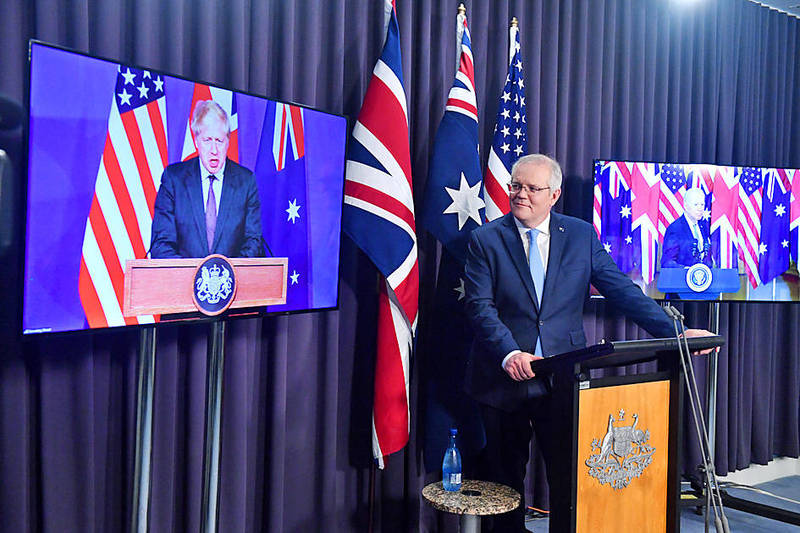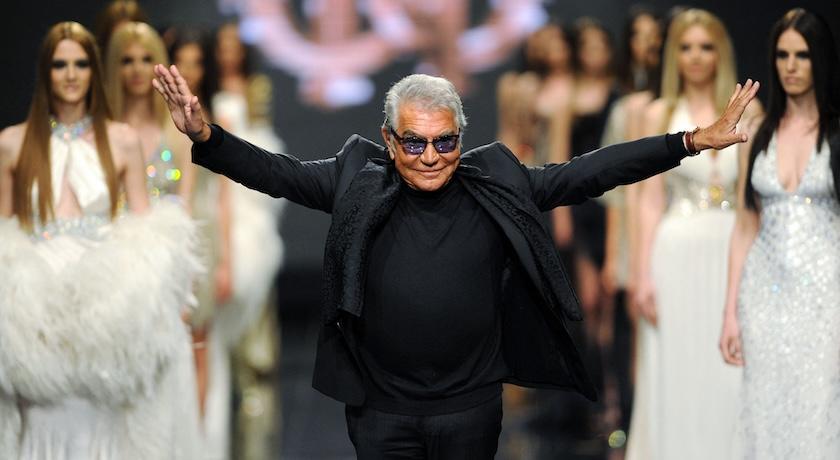《TAIPEI TIMES》 Australia to get subs in new alliance

Australian Prime Minister Scott Morrison, center, attends a virtual news conference with British Prime Minister Boris Johnson, left, and US President Joe Biden at Parliament House in Canberra yesterday. Photo: EPA-EFE
‘ONE-OFF’ DEAL: Australia would become the only state, after Britain, that the US has helped to build a nuclear fleet, which a White House official called ‘unique’
/ AFP, SYDNEY
The US on Wednesday announced a new alliance with Australia and Britain to strengthen military capabilities in the face of a rising China, with Canberra to receive a nuclear submarine fleet and US cruise missiles.
US President Joe Biden, Australian Prime Minister Scott Morrison and British Prime Minister Boris Johnson did not mention China in unveiling their alliance, dubbed AUKUS — but their intent was clear, and their announcement prompted fury in Beijing.
China yesterday condemned the deal as an “extremely irresponsible” threat to stability in the region.
The agreement also left Paris furious, as Australia scrapped a US$40 billion 2016 deal to purchase conventional submarines from France.
“This initiative is about making sure that each of us has a modern capability — the most modern capabilities we need — to maneuver and defend against rapidly evolving threats,” Biden said, speaking in Washington.
Morrison said that the three all respected “freedom” and “the rule of law,” and that the alliance would help ensure security in the region.
The allies often reference the rule of law and freedoms when railing against China’s military build-up in the South China Sea.
The first major initiative announced under the new alliance was a fleet of eight state-of-the-art nuclear-powered submarines for Australia.
The submarines, said Biden and the other leaders, would not be nuclear-armed, only powered with nuclear reactors.
They would allow Australia’s military to travel, and strike targets, far from its coast.
They “are quieter, faster and have longer endurance, which will allow Australia to deploy its future submarines to Indo-Pacific locations for much longer periods of time,” said Ashley Townshend of the US Studies Centre at the University of Sydney.
In addition to the submarine fleet, a senior Biden administration official said AUKUS would combine forces on “cyber, AI [artificial intelligence] — particularly applied AI — quantum technologies and some undersea capabilities as well.”
Morrison later said that Australia would also acquire long-range US Tomahawk cruise missiles.
A Biden administration official underlined repeatedly how “unique” the decision was, with Britain being the only other state the US has ever helped to build a nuclear fleet.
“This technology is extremely sensitive,” the official said. “We view this as a one-off.”
With China building up its own navy and repeatedly testing decades of US military dominance across Asia, the creation of AUKUS, with its focus on submarines, is “meant to send a message of reassurance and a determination to maintain a strong deterrent stance,” the US official said.
Beijing swiftly condemned the agreement, with Chinese Ministry of Foreign Affairs spokesman Zhao Lijian (趙立堅) saying that it “seriously undermines regional peace and stability and intensifies the arms race.”
The new alliance also torpedoed Australia’s conventional submarine deal with France, which had been personally backed by French President Emmanuel Macron.
French Minister of Europe and Foreign Affairs Jean-Yves Le Drian called the agreement “a stab in the back.”
“I’m very angry today, and bitter... This is not something allies do to each other,” he said.
In the UK, during a Commons debate on the agreement, former British prime minister Theresa May challenged Johnson as to whether the agreement could lead to the UK being dragged into a war with China over Taiwan.
“What are the implications of this pact for the stance that would be taken by the United Kingdom in its response should China attempt to invade Taiwan?” she asked.
In reply, the prime minister was careful not to rule anything out.
“The United Kingdom remains determined to defend international law and that is the strong advice we would give to our friends across the world, and the strong advice that we would give to the government in Beijing,” he said.
The EU was yesterday to set out a formal strategy to boost its presence in the Indo-Pacific region and also counter China’s rising power.
EU High Representative for Foreign Affairs and Security Policy Josep Borrell said the bloc had not been informed about the AUKUS partnership and was trying to find out more.
Additional reporting by Reuters and The Guardian
新聞來源:TAIPEI TIMES



















